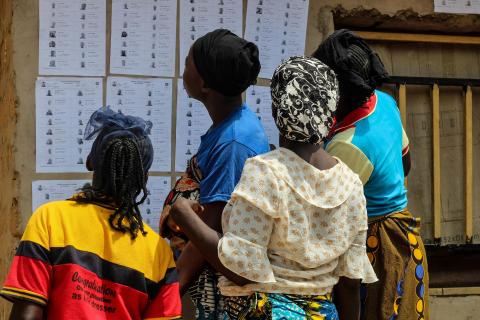Discover hidden stories and unheard voices on land governance issues from around the world. This is where the Land Portal community shares activities, experiences, challenges and successes.
 Follow our
Follow our
Sustainable Development Goals
Blog Series!
Interested in land corruption?
Follow our Land & Corruption Blog Series
for in-depth perspectives from the experts.
Issues
Geographical focus
Magic Comes to Life
Central to the oral history of the Santo Madero community is the legend of a miraculous tree that fell in a violent storm only to reappear a few days later, upright and green. The event, which reflects the magic realism that Colombia is known for, has evolved into a vital part of local folklore and is celebrated by the Afro-Colombian community every year.
In Burundi, a small landlocked country in Africa's Great Lakes region, land is far more than an economic resource – it is the foundation of history, livelihood, and identity for millions. However, Burundi's turbulent past, marked by cycles of conflict, displacement, and return since the 1970s, has created a complex web of competing land claims that threaten efforts to build lasting peace and stability.
It’s a bumper year for citizens of the world to participate in their own governance. Elections are happening almost every other week. Record numbers of countries are holding presidential or parliamentary national or local elections, in democracies and in less democratic political systems. Governments are turning over, expectedly or unexpectedly, or becoming entrenched. Electorates are turning out in great numbers, to punish or endorse, or voting out of the system by staying home.
A Strategic Pivot for the Sustainable Development Goals (SDGs) Promise
Inclusive land governance is critical to securing land rights and achieving the Sustainable Development Goals (SDGs). Secured land rights are foundational for sustainable development, with the access, control and use of land presenting significant responsibilities for governments and their legal systems. Equitable land governance ensures fair access to land, which drives economic growth, reduces poverty, and promotes environmental sustainability.
Photo: Kandukuru Nagarjun, via Flickr, CC BY 2.0
The recent series of ALIGN articles shed light on how civil society, impacted communities and rights defenders across the world have used strategies such as legal action, publishing of mining contracts and stakeholder dialogues to change approaches to land-based investment governance.
Ibrahim has lived on the outskirts of Kenya’s capital city since he was born, 71 years ago. Five generations have lived, loved, studied, worked, and built their homes on this land. He is Kenyan. Proving that to the government and asserting his rights as a citizen, however, has been a life-long struggle.
By: Juana Vera - Delgado
Blog originally published in Common Dreams
The webinar “Pathways to Customary Land & Forest Rights in the Mekong” took place on July 2nd, 2024. This was the second webinar in the series ‘State of Land in the Mekong region’ which aims to highlight the evolving environment of land governance in this dynamic region, including Cambodia, Lao PDR, Myanmar and Vietnam. The webinar attracted 240 participants and featured experts from the Mekong region.
In his keynote speech during the opening plenary session of the the IOS Fair Transitions - LANDac Conference & Summit: Land governance and the politics of fair transitions: Deepening the search for social justice on 3 July, 2024, Bram Büscher, Professor and Chair of the Sociology of Development and Change group at Wageningen University, poses a challenge to the conference: how to rejuvenate the increasingly lost art of speaking truth to power.
To start with the obvious: in this day and age any thought of deepening social justice seems like a difficult propositi
In her keynote speech during the opening plenary session of the the IOS Fair Transitions - LANDac Conference & Summit: Land governance and the politics of fair transitions: Deepening the search for social justice on 3 July, 2024, Morgan Ody, General Coordinator of La Via Campesina and a small-scale vegetable farmer in Brittany, France, describes how power has always been disputed for the last five centuries, and how peasants and indigenous peoples all over the world challenge the powerful.












